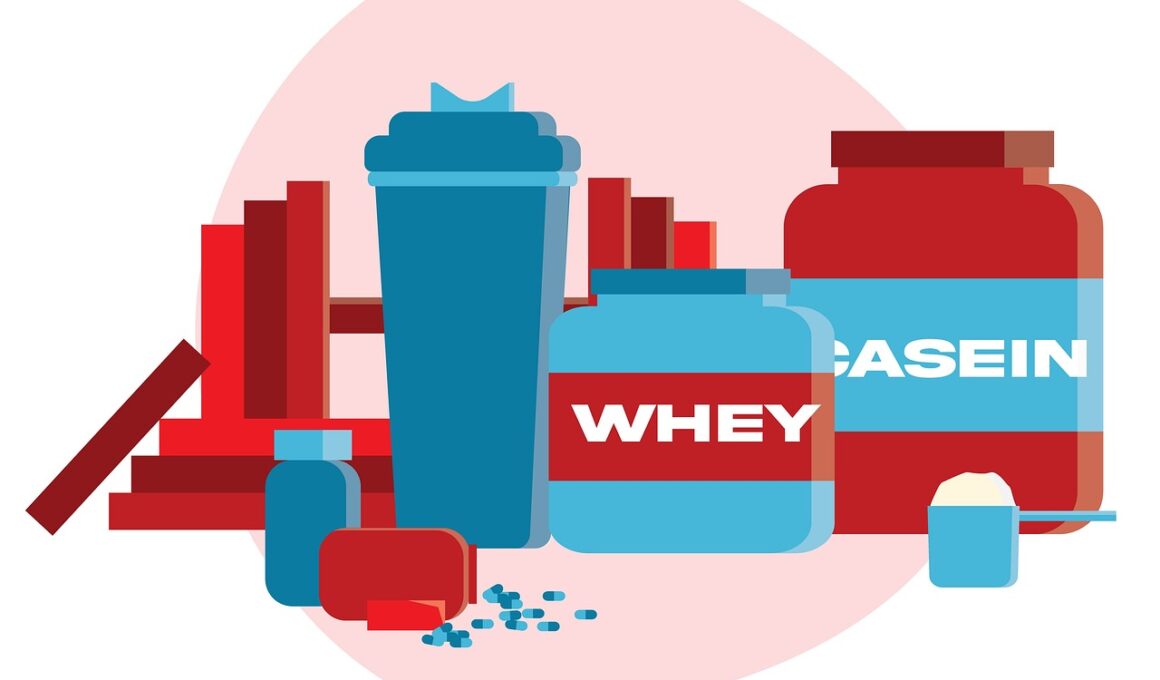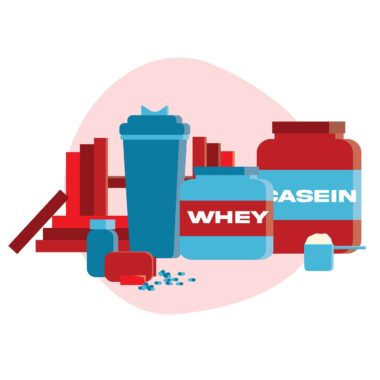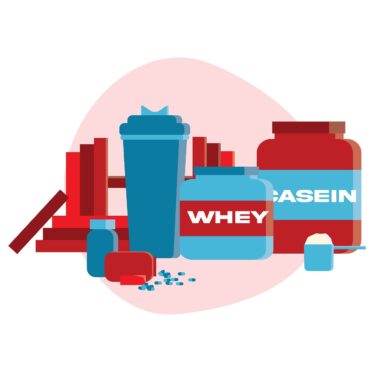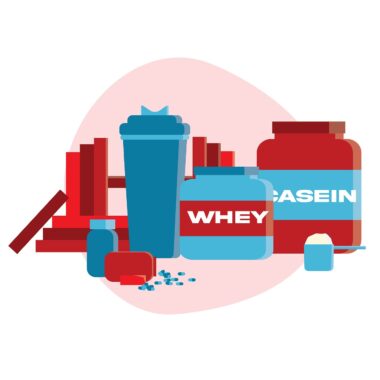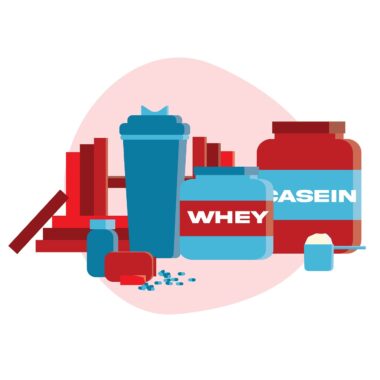Whey vs. Casein: Which Protein Powder is Best?
When it comes to protein powders, the choice often boils down to whey and casein. Both are derived from milk, making them dairy products, but they serve different purposes in the realm of sports nutrition. Whey protein is a fast-digesting protein ideal for post-workout recovery. Its quick absorption means muscle fibers receive nutrients almost immediately, promoting faster recovery and growth. In contrast, casein is a slow-digesting protein suitable for sustained energy release. This makes casein popular for nighttime consumption, as it provides a prolonged supply of amino acids. Choosing between them depends on the timing of nutrient intake and personal fitness goals. For athletes focused on rapid recovery, whey is a strong contender. Conversely, individuals looking for a steady protein intake overnight may prefer casein. Both types of protein offer unique amino acid profiles, which can be beneficial for muscle repair and growth. Understanding these differences can help athletes and fitness enthusiasts make informed choices to enhance their nutrition and performance.
The Benefits of Whey Protein
Whey protein not only aids in muscle recovery but also contributes significantly to muscle growth. High in essential amino acids, whey is particularly rich in branched-chain amino acids (BCAAs), which are crucial for stimulating protein synthesis. This makes whey an excellent post-workout supplement that helps reduce muscle soreness and speeds up recovery time. When combined with resistance training, whey has been shown to improve both strength and lean body mass. Additionally, whey protein may support weight management by promoting satiety, helping individuals maintain or achieve a healthy weight. Many people enjoy the convenience of whey protein since it mixes easily in shakes, smoothies, or even baked goods. The variety of flavors available makes it a popular choice among athletes and fitness enthusiasts. It can be consumed shortly after workouts to deliver immediate nourishment or as part of a meal replacement. For those with lactose intolerance, whey protein isolate can offer a lower-lactose option. Overall, the benefits of whey protein make it a staple in many athletes’ diets, enhancing recovery and performance.
The Advantages of Casein Protein
Casein protein, known for its slow-digesting properties, offers a unique advantage in muscle maintenance and growth. Since it releases amino acids gradually, it provides a steady supply to the bloodstream, making it an ideal choice for overnight muscle recovery. Consuming casein before bed can enhance muscle protein synthesis during sleep, which is essential for repair and growth. This slow absorption can also help minimize muscle breakdown during long periods without food. Casein’s thick consistency makes it perfect for shakes, puddings, or overnight oats, appealing to those with culinary creativity. In addition to muscle benefits, casein has been linked to improved satiety, making it helpful in weight management strategies. Many individuals find that casein keeps them fuller longer, potentially curbing cravings and reducing excessive snacking. With its high calcium content, casein also contributes to bone health, an important factor for anyone participating in physical activities. Overall, casein serves as a versatile option for athletes pursuing long-lasting energy and muscle support.
When considering protein powders, taste and texture can greatly affect user experience. Whey protein tends to mix smoothly with liquids, creating a lighter texture that some may prefer in shakes and smoothies. The flavor options are abundant, ranging from chocolate to vanilla, allowing for customization based on preference. On the other hand, casein protein’s thicker texture can be more satisfying for some people, especially in recipes requiring consistency such as protein pancakes or desserts. This can be appealing to those who enjoy a more substantial meal replacement. However, not all protein powders are created equal. The quality of the protein source, manufacturing processes, and presence of additives should be carefully considered. Many brands offer protein powders that contain unnecessary fillers and artificial ingredients. Checking the nutritional labels and opting for clean, recognizable ingredients is crucial for anyone evaluating protein supplementation. Remember that personal preferences and dietary restrictions, such as lactose sensitivity, also dictate which protein is optimal. Ultimately, the right choice will align with individual nutrition goals and lifestyle.
Another important aspect of choosing between whey and casein protein is how each contributes to specific fitness goals. For athletes aiming for immediate post-workout recovery, whey is usually the preferred protein type. Its quick absorption rate means that it can effectively jumpstart muscle recovery right after intense physical activity. Alternatively, those focusing on endurance sports may benefit from casein’s slow release of protein over time, helping maintain muscle health during prolonged training sessions. When comparing the two, one must understand that both types can be incorporated into a balanced diet. For strength trainers, including both whey and casein may provide comprehensive nutrition to support muscle growth and repair. Blending both provides the advantage of immediate post-workout replenishment, followed by sustained amino acid delivery throughout the day. Many nutritionists recommend a combination of both proteins for optimal performance results. This strategy allows for flexible intake based on daily physical activity and encourages adaptation to training demands. Evaluating these benefits helps athletes select the most suitable protein source.
Price point also plays a significant role in the decision-making process regarding protein supplements. Generally, whey protein is often more affordable compared to casein protein, making it accessible to a wider range of consumers. Bulk purchases or store brands may offer even more savings for those committed to regular protein use. On the other hand, casein can be higher-end, depending on the quality and processing involved in manufacturing quality. Therefore, budget-conscious individuals may lean toward whey protein if cost is a primary concern. However, individuals should weigh the nutritional benefits of each type along with price. While it might be tempting to choose the less expensive option, investing in high-quality protein sources will yield better long-term benefits for health and performance. Additionally, consider various protein-rich foods, including legumes, meats, and dairy, which provide complementary nutrients that support overall wellness. Finding diverse sources of protein, rather than relying entirely on supplements, is vital for achieving a balanced diet.
In conclusion, the decision between whey and casein protein depends on specific needs and individual fitness objectives. Whey appeals primarily to individuals looking for rapid recovery post-exercise, while casein serves well during long periods without meal options, such as overnight. Both have unique benefits and can fit into various dietary strategies for muscle maintenance, growth, and recovery. Additionally, flavor, texture, budget, and individual digestive responses play essential roles in selecting the best protein supplement. Ultimately, the best approach is to experiment with both protein types to find what works optimally for your body and lifestyle. The combination strategy is beneficial for many, allowing users to experience the advantages of both protein sources. Regular intake of high-quality protein contributes significantly to performance, recovery, and overall health. Whatever your choice may be, staying informed and making conscious dietary decisions can lead to improved athletic performance and recovery, helping you achieve your fitness goals.
So, whether you opt for whey or casein, be sure to integrate your choice into a balanced diet rich in whole foods. Regular assessments of your fitness progress and nutritional needs will help guide your supplement choices. As your workouts and goals evolve, so too may the types of protein best suited to support your journey. Understanding the nuances between these two types of protein can lead to more effective supplementation strategies and enhanced results. By prioritizing quality and alignment with personal objectives, you create a powerful tool to support your sports nutrition needs.
